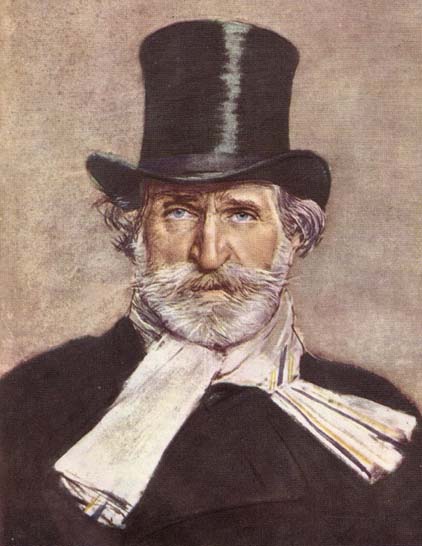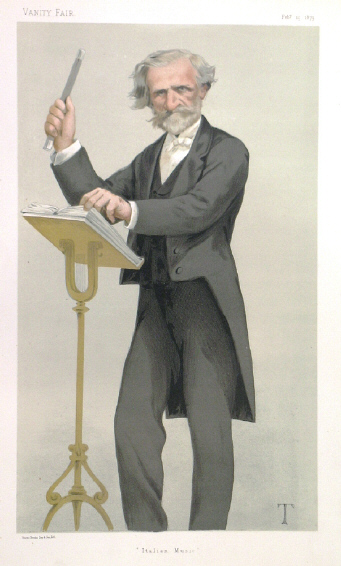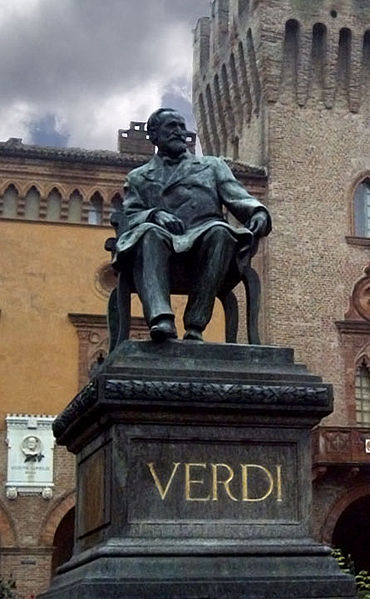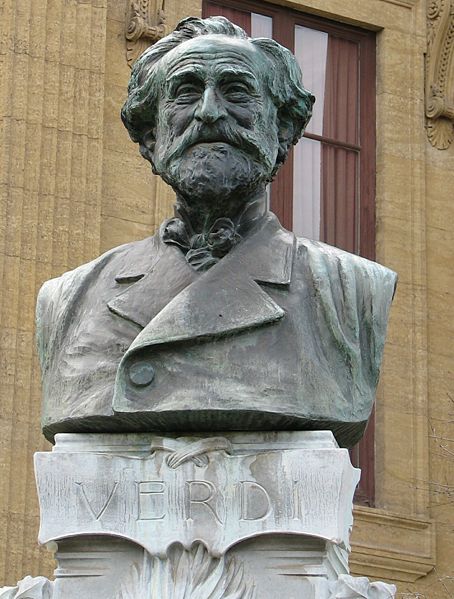<Back to Index>
- Chemist Henry Cavendish, 1731
- Composer Giuseppe Fortunino Francesco Verdi, 1813
- President of the South African Republic Stephanus Johannes Paulus Kruger, 1825



Giuseppe Fortunino Francesco Verdi (October 10, 1813 – January 27, 1901) was an Italian Romantic composer, mainly of opera. He was one of the most influential composers of the 19th century. His works are frequently performed in opera houses throughout the world and, transcending the boundaries of the genre, some of his themes have long since taken root in popular culture - such as "La donna è mobile" from Rigoletto, "Va, pensiero" (The Chorus of the Hebrew Slaves) from Nabucco, "Libiamo ne' lieti calici" (The Drinking Song) from La traviata and the "Grand March" from Aida. Although his work was sometimes criticized for using a generally diatonic rather than a chromatic musical idiom and having a tendency toward melodrama, Verdi’s masterworks dominate the standard repertoire a century and a half after their composition.
Verdi was born the son of Carlo Giuseppe Verdi and Luigia Uttini in Le Roncole, a village near Busseto, then in the Département Taro which was a part of the First French Empire after the annexation of the Duchy of Parma and Piacenza. The baptismal register, on October 11, lists him as being "born yesterday", but since days were often considered to begin at sunset, this could have meant either 9 or 10 October. The next day, he was baptized in the Roman Catholic Church in Latin as Joseph Fortuninus Franciscus. The day after that (Tuesday), Verdi's father took his newborn the three miles to Busseto, where the baby was recorded as Joseph Fortunin Francois; the clerk wrote in French. "So it happened that for the civil and temporal world Verdi was born a Frenchman." When he was still a child, Verdi's parents moved from Piacenza to Busseto, where the future composer's education was greatly facilitated by visits to the large library belonging to the local Jesuit school. Also in Busseto, Verdi was given his first lessons in composition.
Verdi went to Milan when he was twenty to continue his studies. He took private lessons in counterpoint while attending operatic performances, as well as concerts of, specifically, German music. Milan's beaumonde association convinced him that he should pursue a career as a theatre composer. During the mid 1830s, he attended the Salotto Maffei salons in Milan, hosted by Clara Maffei.
Returning
to Busseto, he became the town music master and, with the support of
Antonio Barezzi, a local merchant and music lover who had long
supported Verdi's musical ambitions in Milan, Verdi gave his first
public performance at Barezzi’s home in 1830. Because
he loved Verdi’s music, Barezzi invited Verdi to be his daughter
Margherita's music teacher, and the two soon fell deeply in love. They
were married on May 4, 1836 and Margherita gave birth to two children,
Virginia Maria Luigia (March 26, 1837 - August 12, 1838) and Icilio
Romano (July 11, 1838 - October 22, 1839). Both died in infancy while
Verdi was working on his first opera and, shortly afterwards,
Margherita died on June 18, 1840. Verdi adored his wife and children,
and he was devastated by their untimely deaths. The production by Milan's La Scala of his first opera, Oberto in
November 1839 achieved a degree of success, after which Bartolomeo
Merelli, La Scala's impresario, offered Verdi a contract for two more
works. It was while he was working on his second opera, Un giorno di regno,
that Verdi's wife died. The opera, given in September 1840, was a flop
and he fell into despair and vowed to give up musical composition
forever. However, Merelli persuaded him to write Nabucco and its opening performance in March 1842 made Verdi famous. Legend has it that it was the words of the famous Va pensiero chorus of the Hebrew slaves that inspired Verdi to write music again. A
large number of operas - 14 in all - followed in the decade after 1843,
a period which Verdi was to describe as his "galley years". These
included his I Lombardi in 1843, and Ernani in 1844. For some, the most original and important opera that Verdi wrote is Macbeth in
1847. For the first time, Verdi attempted an opera without a love
story, breaking a basic convention in 19th century Italian opera. In 1847, I Lombardi, which was revised and renamed Jerusalem, was produced by the Paris Opera.
Due to a number of Parisian conventions that had to be honored
(including extensive ballets), it became Verdi's first work in the
French Grand opera style. Sometime in the mid-1840s, after the death of Margherita Barezzi, Verdi began an affair with Giuseppina Strepponi, a soprano in the twilight of her career. Their cohabitation before marriage was regarded as scandalous in some of the places they lived, but Verdi and Giuseppina married on August 29, 1859 at Collonges-sous-Salève, near Geneva.
While living in Busseto with Strepponi, Verdi bought an estate two
miles from the town in 1848. Initially, his parents lived there, but,
after his mother's death in 1851, he made the Villa Verdi at Sant'Agata in Villanova sull' Arda his home until his death. As the "galley years" were drawing to a close, Verdi created one of his greatest masterpieces, Rigoletto, which premiered in Venice in 1851. Based on a play by Victor Hugo (Le roi s'amuse), the libretto had to undergo substantial revisions in order to satisfy the epoch's censorship, and the composer was on the verge of giving it all up a number of times. The opera quickly became a great success. With Rigoletto,
Verdi sets up his original idea of musical drama as a cocktail of
heterogeneous elements, embodying social and cultural complexity, and
beginning from a distinctive mixture of comedy and tragedy. Rigoletto's musical range includes band-music such as the first scene or the song La donna è mobile, Italian melody such as the famous quartet "Bella figlia dell' amore", chamber music such
as the duet between Rigoletto and Sparafucile and powerful and concise
declamatos often based on key-notes like the C and C# notes in
Rigoletto and Monterone's upper register. There followed the second and third of the three major operas of Verdi's "middle period": in 1853 Il Trovatore was produced in Rome and La traviata in Venice. The latter was based on Alexandre Dumas, fils' play The Lady of the Camellias. Between 1855 and 1867, an outpouring of great Verdi operas followed, among them such repertory staples as Un ballo in maschera (1859), La forza del destino (commissioned by the Imperial Theatre of Saint Petersburg for 1861 but not performed until 1862), and a revised version of Macbeth (1865). Other somewhat less often performed include Les vêpres siciliennes (1855) and Don Carlos (1867),
both commissioned by the Paris Opera and initially given in French.
Today, these latter two operas are most often performed in their revised Italian versions. Simon Boccanegra followed in 1857. In 1869, Verdi was asked to compose a section for a requiem mass in memory of Gioachino Rossini and
proposed that this requiem should be a collection of sections composed
by other Italian contemporaries of Rossini. The requiem was compiled
and completed, but it was cancelled at the last minute (and was not
performed in Verdi's lifetime). Verdi blamed this on the lack of
enthusiasm for the project by the intended conductor, Angelo Mariani, who had been a longtime friend of his. The episode led to a permanent break in their personal relations. The soprano Teresa Stolz (who
later had a strong professional - and, perhaps, romantic - relationship
with Verdi) was at that time engaged to be married to Mariani, but she
left him not long after. Five years later, Verdi reworked his "Libera
Me" section of the Rossini Requiem and made it a part of his Requiem Mass, honoring the famous novelist and poet Alessandro Manzoni, who had died in 1873. The complete Requiem was first performed at the cathedral in Milan on May 22, 1874. Verdi's grand opera, Aida, is sometimes thought to have been commissioned for the celebration of the opening of the Suez Canal in 1869, but, according to one major critic, Verdi
turned down the Khedive's invitation to write an "ode" for the new
opera house he was planning to inaugurate as part of the canal opening
festivities. The opera house actually opened with a production of Rigoletto.
Later in 1869/70, the organizers again approached Verdi (this time with
the idea of writing an opera), but he again turned them down. When they
warned him that they would ask Charles Gounod instead and then threatened to engage Richard Wagner's services, Verdi began to show considerable interest, and agreements were signed in June 1870. Teresa Stolz was associated with both Aida and the Requiem (as
well as a number of other Verdi roles). The role of Aida was written
for her, and although she did not appear in the world premiere in Cairo
in 1871, she created Aida in the European premiere in Milan in February
1872. She was also the soprano soloist in the first and many later
performances of the Requiem.
It was widely believed that she and Verdi had an affair after she left
Angelo Mariani, and a Florence newspaper criticised them for this in
five strongly worded articles. Whether there is any truth to the
accusation may never be known with any certainty. However, after
Giuseppina Strepponi's death, Teresa Stolz became a close companion of
Verdi until his own death. Verdi
and Wagner, who were the leaders of their respective schools of music,
seemed to resent each other greatly. They never met. Verdi's comments
on Wagner and his music are few and hardly benevolent ("He invariably
chooses, unnecessarily, the untrodden path, attempting to fly where a
rational person would walk with better results"), but at least one of
them is kind: upon learning of Wagner's death, Verdi lamented: "Sad,
sad, sad! ... a name that will leave a most powerful impression on the
history of art." Of Wagner's comments on Verdi, only one is well-known. After listening to Verdi's Requiem, the great German, prolific and eloquent in his comments on some other composers, said, "It would be best not to say anything." During the following years, Verdi worked on revising some of his earlier scores, most notably new versions of Don Carlos, La forza del destino, and Simon Boccanegra. Otello, based on William Shakespeare's play, with a libretto written by the younger composer of Mefistofele, Arrigo Boito,
premiered in Milan in 1887. Its music is "continuous" and cannot easily
be divided into separate "numbers" to be performed in concert. Some
feel that although masterfully orchestrated, it lacks the melodic
lustre so characteristic of Verdi's earlier, great, operas, while
many critics consider it Verdi's greatest tragic opera, containing some
of his most beautiful, expressive music and some of his richest
characterizations. In addition, it lacks a prelude, something Verdi
listeners are not accustomed to. Arturo Toscanini performed
as cellist in the orchestra at the world premiere and began his
friendship with Verdi (a composer he revered as highly as Beethoven). Verdi's last opera, Falstaff, whose libretto was also by Boito, was based on Shakespeare's Merry Wives of Windsor and Victor Hugo's
subsequent translation. It was an international success and is one of
the supreme comic operas which shows Verdi's genius as a contrapuntist. In 1894, Verdi composed a short ballet for a French production of Otello, his last purely orchestral composition. Years later, Arturo Toscanini recorded the music for RCA Victor with the NBC Symphony Orchestra which complements the 1947 Toscanini performance of the complete opera. In 1897, Verdi completed his last composition, a setting of the traditional Latin text Stabat Mater. This was the last of four sacred works that Verdi composed, Quattro Pezzi Sacri,
which are often performed together or separately. The first performance
of the four works was on April 7, 1898, at the Grande Opéra,
Paris. The four works are: Ave Maria for mixed chorus; Stabat Mater for mixed chorus and orchestra; Laudi alla Vergine Maria for female chorus; and Te Deum for double chorus and orchestra. On 29 July 1900 King Umberto I of Italy was assassinated and that deed horrified the aged composer. While staying at the Grand Hotel et de Milan in Milan, Verdi had a stroke on January 21, 1901. He grew gradually more feeble and died six days later, on January 27, 1901. Arturo Toscanini conducted
the vast forces of combined orchestras and choirs composed of musicians
from throughout Italy at the state funeral for Verdi in Milan. To date,
it remains the largest public assembly of any event in the history of
Italy. Music historians have long perpetuated a myth about the famous Va, pensiero chorus sung in the third act of Nabucco. The myth reports that, when the Va, pensiero chorus was sung in Milan,
then belonging to the large part of Italy under Austrian domination,
the audience, responding with nationalistic fervor to the exiled
slaves' lament for their lost homeland, demanded an encore of the
piece. As encores were expressly forbidden by the government at the
time, such a gesture would have been extremely significant. However,
recent scholarship puts this to rest. Although the audience did indeed
demand an encore, it was not for Va, pensiero but rather for the hymn Immenso Jehova, sung
by the Hebrew slaves to thank God for saving His people. In light of
these new revelations, Verdi's position as the musical figurehead of
the Risorgimento has been correspondingly downplayed. On the other hand, during rehearsals, workmen in the theater stopped what they were doing during Va, pensiero and applauded at the conclusion of this haunting melody while
the growth of the "identification of Verdi's music with Italian
nationalist politics" is judged to have begun in the summer 1846 in
relation to a chorus from Ernani in which the name of one of its characters, "Carlo", was changed to "Pio", a reference to Pope Pius IX's grant of an amnesty to political prisoners. The myth of Verdi as Risorgimento's composer also led to claims that the slogan "Viva VERDI" was used throughout Italy to secretly call for Vittorio Emanuele Re D' Italia (Victor Emmanuel King of Italy), referring to Victor Emmanuel II, then king of Sardinia. The Chorus of the Hebrews (the English title for Va, pensiero)
has another appearance in Verdi folklore. Prior to his body being
driven from the cemetery to the official memorial service and its final
resting place at the Casa di Riposo per Musicisti, Arturo Toscanini conducted a chorus of 820 singers in "Va, pensiero". At the Casa, the Miserere from Il trovatore was sung. Verdi was elected as a member of the Chamber of Deputies in 1861 following a request of Prime Minister Cavour but in 1865 he resigned from the office. In 1874 he was named Senator of the Kingdom by King Victor Emanuel II.

